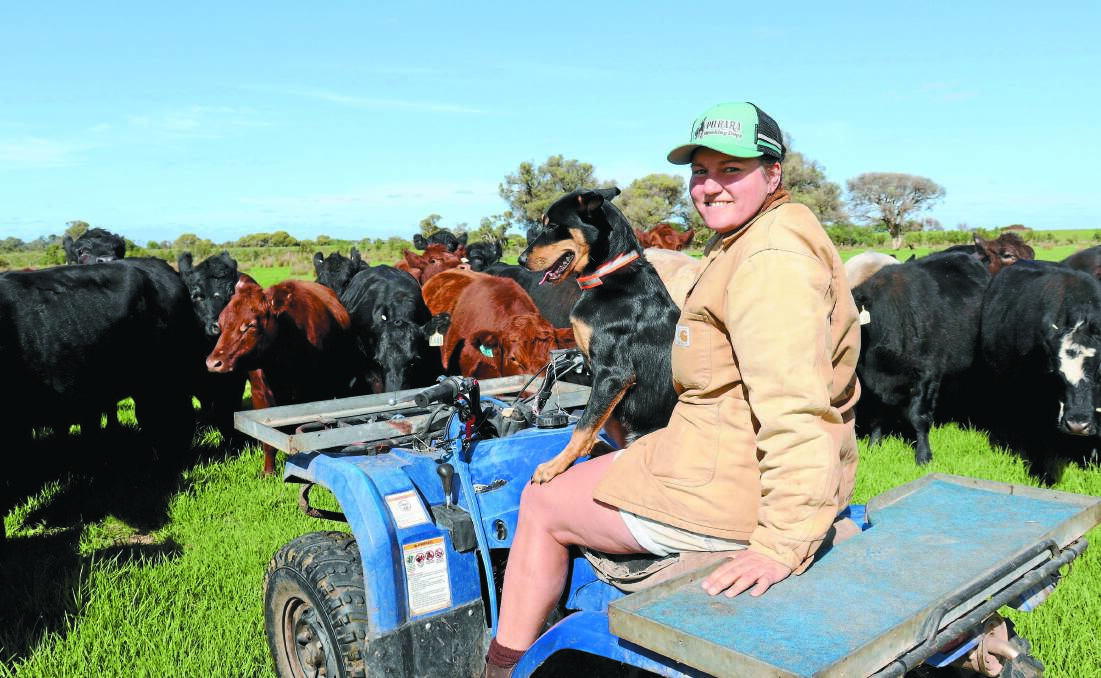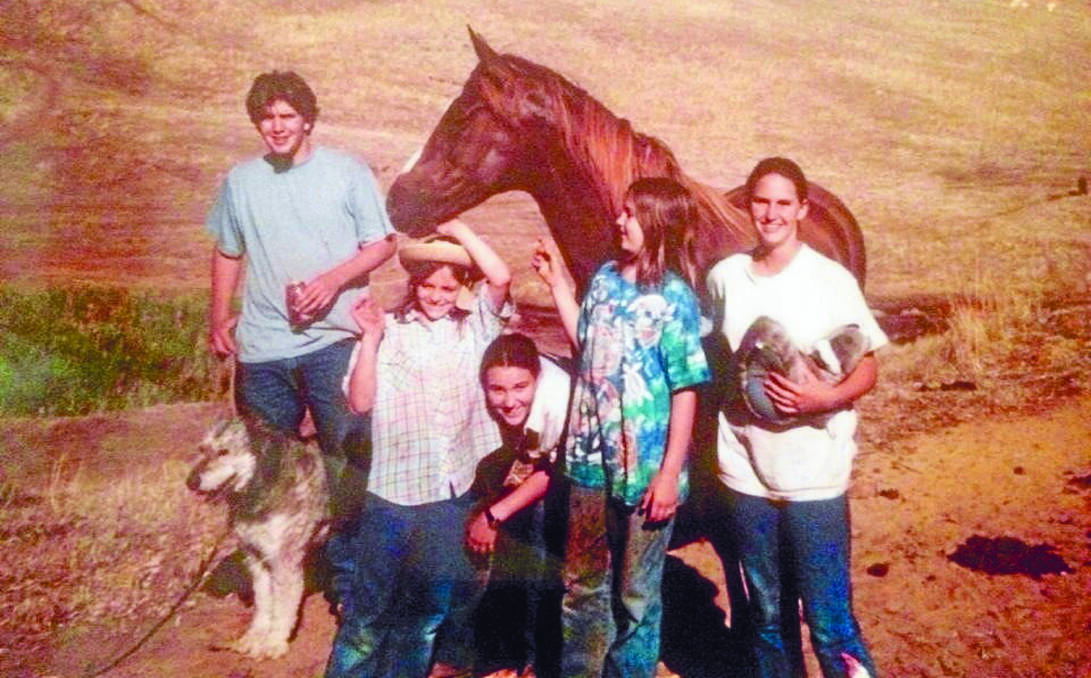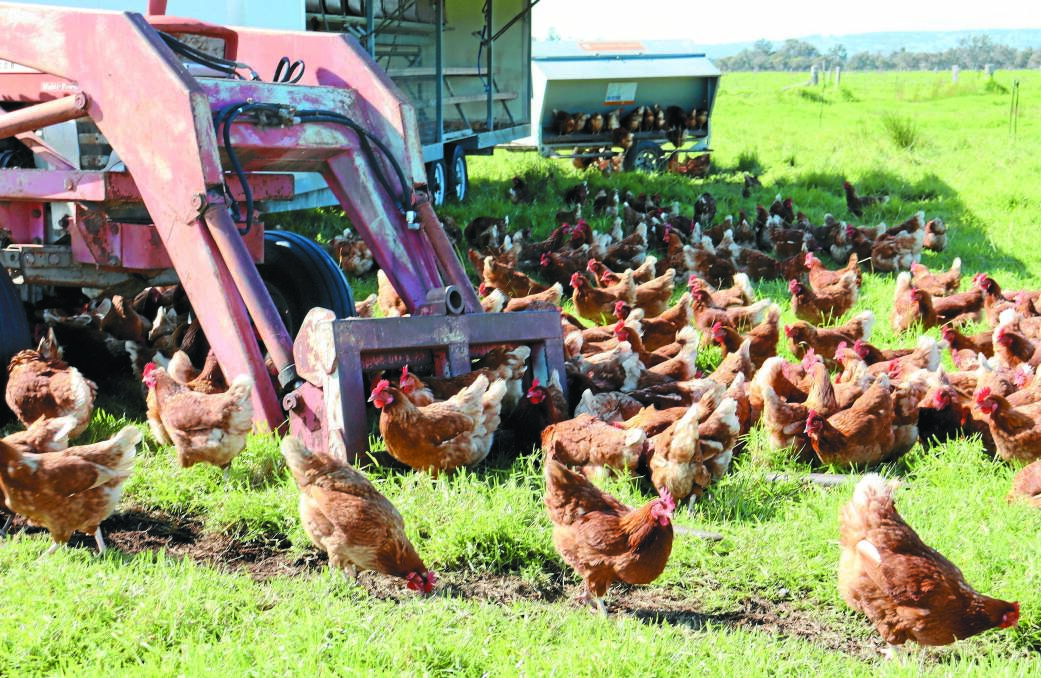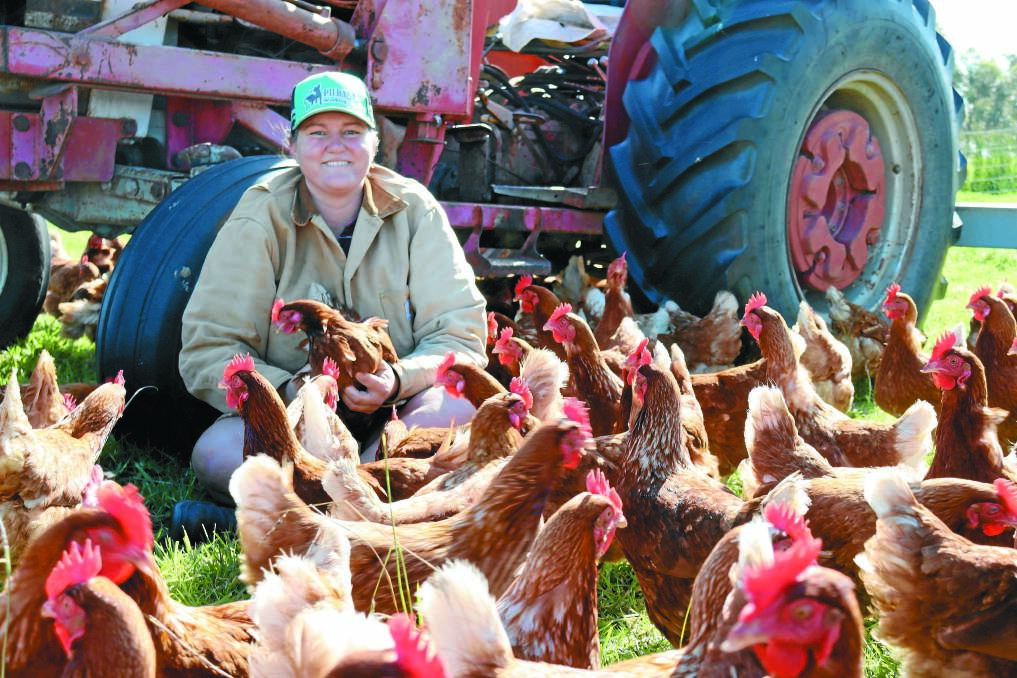
IF you think you are doing a good job or the right thing, would you be happy at the end of the day to sit down and have a beer in your production system?
It is the pub test of farming, according to Runnymede Farm's Blythe Calnan, and it is one she would pass with flying colours.
"I love sitting down with my cows in the evening, having a beer and observing them.
"Same goes with my chooks, I'd happily sit with them for hours and enjoy a beer with them.
"I really love that environment and am proud of the way we raise our animals and the quality of life we give them."
Ms Calnan, 37, isn't a generational farmer, and beef and chicken farming haven't exactly coursed through her veins.
Agriculture wasn't always the dream, it "just kind of happened".
In fact, her father was a mining engineer and mother, a school teacher, who fortuitously landed at Shay Gap in the Pilbara, with five children and a menagerie of animals.
The menagerie was home to a few horses, so Ms Calnan and her family came to know the station on which Shay Gap was built, Yarrie.

Through Yarrie station she became close mates with owner Annabelle Coppin and fostered a passion for the beef industry and agriculture, which burns stronger than ever today.
The pair spent time out at the station mustering and developing a love of the land up in the stunning landscape of the Pilbara, before Ms Calnan moved to Perth and made a "short appearance" at university, studying biological science.
"We kept horses while we were in Perth," Ms Calnan said.
"We brought them from up north with us, so we kept in touch with our life up there.
"It was a big change coming down to the city."
Ms Calnan yearned for a life outside of the big smoke and it wasn't long before she found her way back on the land.
Perhaps she had developed a greater appreciation for rural living having experienced alternatives.
Ms Calnan immersed herself in the red dirt and flying dust of the Kimberley region at Moola Bulla and Springvale stations.
She then went on to explore different industries including native nursery propagation, pearl farming in the Buccaneer Archipelago with a small team on a tiny house boat, tour guiding of a Bauxite mine and then a variety of mine work including lab work, machinery operator and crew leader.
When the global financial crisis hit Ms Calnan took a voluntary redundancy from Rio Tinto in Queensland and returned back to WA, where she - yet again - was drawn back to her passion: cattle.
Her first stop?
Yarrie station of course, where she revelled in the hard work, steep learning curves and family environments.
And a short stay ended up becoming much longer.

"Annabelle was great to work with and her mum, Ann, is fantastic and has been a really big role model for me," Ms Calnan said.
"There is a really strong team of women up there, who do a really good job, and are focused on animal welfare, good stockmanship, innovative thinking and care of country."
At the time, Ms Coppin had completed a Nuffield Scholarship on the Australian live export trade, which had opened a window of opportunity for employment in the Middle East.
Ms Coppin needed some extra hands on deck and Ms Calnan's experience in animal handling, cultural exposure and adventurous nature made her the ideal candidate.
At the ripe age of 25, it was only the beginning of an "amazing career" providing support to exporters and importers of Australian livestock in Bahrain, Kuwait, Jordan, Oman and Israel.
"When the live export ban was introduced in 2011, my focus became more on the welfare management in our international supply chains," Ms Calnan said.
"I spent a lot of time in the Middle East helping facilities that receive Australian animals understand the expectations of the Exporter Supply Chain Assurance System (ESCAS) and developing systems, which would meet the animal welfare outcomes required.
"That was an amazing job.
"You would fly into a country, get a hire car and head out to a facility to find out what was going on and how you could help them improve animal welfare while imparting valuable knowledge in animal behaviour, handling and management that empowered the workforce, all while making the industry more secure for Australian producers."

Ms Calnan was involved with the work for about five years, flying in and out, as well as spending a short time in Russia, helping to develop systems for training staff in low stress stock handling and animal husbandry.
"A high part of the problem was we were sending animals from rangeland environments with minimal handling into areas that were used to working with highly domesticated animals," she said.
"Most facilities didn't have the skills or infrastructure to cope with these kinds of animals."
"It was great for them to get a better understanding as to why animals behave the way they do.
"It was a very rewarding role, one which has improved the welfare of animals from all over the world and the people that work with them."
Ms Calnan was still training in international markets when she met her partner Gregg Hooper.
Mr Hooper was a helicopter engineer, fixing a chopper on one of the stations Ms Calnan was working on.
He introduced Ms Calnan to farming systems that interested him, which were more along the regenerative lines and the pair started discussing purchasing their own piece of land.
"We developed an interest in farming systems that really worked with Mother Nature as an ally, as opposed to a battle," Ms Calnan said.
"This was a bit of a revelation.
"To look at it this way and at these systems that people were using, which were all about working with Mother Nature to enhance our environment, rather than use chemicals and constant inputs that did not improve the overall health of the system."
After some time searching for their own piece of land they stumbled across the 40 hectare (100 acre) Runnymede, Binningup.
It was there they started to fulfil their dream of developing their own farming business.
They started with a mob of unmatched cows and calves from up north.
"Those cows have now moved on but their best attributes live on in the genetics of their current cow herd," Ms Calnan said.
"We had a pretty clear mind of what we wanted out of our herd direction wise and cattle wise we started following companies including Pharo Cattle Company, United States of America."
Ms Calnan met Kit Pharo at Beef Week, Rockhamnpton, Queensland, in 2015.
She and Mr Hooper later visited his property in the USA and were extremely impressed with his philosophy and herd.
"They have developed a very moderate framed animal which requires little input with natural parasite resistance that thrive in a grassfed environment," she said.
Ms Calnan added that Runnymede used the company's semen straws for their program over the past four years.
It was something she labelled as a huge learning curve.
"The first year artificially inseminating old cracker station cows was pretty wild."
The couple built up lease blocks around the property to expand their cattle herd and perhaps it was fate that their paths crossed with dairy farmer Graham Manning, who's family had milked at Darena for more than 70 years (where Ms Calnan and Mr Hooper both farm now).
"Graham was leasing a block for cattle next-door and needed to use our yards," Ms Calnan said.
"One night he turned up in the dark, in the rain, with no torch to draft cows to take home for calving.
"I looked at the fire and the comfy couch and turned around and put my jacket on to go and help him, I guess the friendship started there.
"Over time he convinced me to come and relief milk for him, I'd stopped travelling and had heard how much all producers could learn from working in the dairy system.
"Mostly that they're probably the hardest working farmers on the planet."
However, the dairy farming chapter was cut short when Mr Manning found himself caught up in the Brownes' contract cuts at the end of 2016.
"Graham's contract wasn't renewed, the same with a few other farmers, and after about 150 years of his family milking he had to close up his dairy," Ms Calnan said.
"That was absolutely bloody devastating.
"We helped him through it, we all cried when the dairy cows got trucked out for the last time and at the end of the year we were all pouring milk down the drain.
"Honestly, it was a really horrible time."
With a background in the industry, Ms Calnan and Mr Hooper helped Mr Manning transition over to beef.
It was around that time Mr Manning decided to put Darena on the market.
"After the property had been on the market for a while he actually approached us and said 'right I'd like to get you guys on this place, what can we do to set that up'," Ms Calnan said.
"We had a think about it and had a bit of a chat, throwing different ideas around.
"We ended up coming to a contract and arrangement that would involve us selling our block in Binningup, taking over this block pretty much almost immediately so Graham and his wife Jayne could start their retirement."
In 2019, Ms Calnan and Mr Hooper moved their business to Darena, but it would take at least two years until their Binningup property was sold.
Ms Calnan described the move as both a "really big learning curve" and a "pretty tough time" as far as coming from a relatively small, mostly grazing operation and onto a more dairy based block, which runs significant flood irrigation and more intensive management systems.
Another challenge was trying to manage the transition from conventional best practice to regenerative principles.
But the couple got through it with the support and patience of the Mannings.
"To have someone like Graham approach us even with the idea that he wanted us to take on his family property," Ms Calnan said.
"To have developed those relationships and to have people believe in my ability and integrity to give me opportunities like that makes me really proud."
After a couple of tough years, Ms Calnan, Mr Hooper and Mr and Mrs Manning finally had things fall into place and ownership changed hands in April this year.
Today, Runnymede at Darena, operates off 90ha plus an additional 140ha, half of which is under a lease/buy arrangement and the remainder comprised of shorter term lease blocks.
The operation runs about 120 breeders, as well as finishing cattle over the summer.
Between agistment, trading and finishing cattle, there are between 200 and 300 head over summer.
They are of mixed breed, but the base of the herd is Angus, both red and black.
Once cattle are finished they are sold through Dirty Clean Food, which is a regenerative protein platform developed by Wide Open Agriculture.
"We thought it would be a long-time before we had all of our products from the farm going into a supply chain that values the way we farm," Ms Calnan said.
"But fortunately we developed this relationship with Dirty Clean Food and they have been so supportive and so good to work with.
"Most of our product now goes through them, getting a premium on our grassfed product and going to consumers who really appreciate the way we farm.
"I think that's all come down to good timing more than anything else."
Meanwhile, after losing some income when the dairy stopped operating at the end of 2016, Ms Calnan hatched the idea of an egg business.
Runnymede Eggs was born, as an enterprise that complemented the land use, rather than competed for it.
"We always liked the system for eggs because it is a relatively short turnaround, there isn't a lot of processing involved as far as accessing small scale abattoir and cold chain storage," Ms Calnan said.
"Eggs were pretty appealing as it's a good cash-flow turnover and a relatively simple kind of addition."
While it may have seemed like a simple change, it was difficult to get it started due to rules and regulations.
Runnymede at Binningup was a low lying area and there were concerns of water contamination.
Fortunately, the land at Darena was higher up and clay based, which was better suited for running pastured poultry.
An added bonus was the irrigation country thrived on the extra nutrients from the chickens - in turn it provided a great environment for the animals to live in.
"It is a bit niche, it is labour intensive, the whole system is mobile, so everything moves around the farm," Ms Calnan said.
"The manure and things have a positive environmental impact, but that means moving things by hand and moving things at night."
The chickens are contained by netting and guarded by Maremma guard dogs, as the constant movement manages the impact they have on the ground.
While egg farming may not be as labour intensive as dairy farming, people are still needed on the property daily.
Quite simply it is too big of a system to 'leave with mum and dad'.
Ms Calnan said it was nice to employ local mothers, who were attracted by flexible hours and a pleasant work environment, so if herself and Mr Hooper wanted some time away, especially after the past few tough years, then they could.
"We do really want to get into the system where we can live the lifestyle and quality of life that we want," she said.
"That's a really big part of the holistic management outlook, in addition to the environmental and welfare aspects that the business has to be profitable, the people have to be happy and healthy, we have to be giving back to the community a bit, we need to be looking at the whole picture."
Runnymede Eggs are sold mostly through Dirty Clean Food, as well as at the Farmers Market every Saturday morning in Perth.
Ms Calnan has found a greater awareness of food production systems, particularly in eggs, has driven an investment in the product and sales.
"I think a lot of people first buy our eggs because of the ethics and then once they realise the quality difference as well - it is a no brainer.
"Our eggs sell for $8 a dozen at the markets, where you can't pay $5 for a coffee and then say $8 for eggs is too much and still say you care about animal welfare.
"As far as a good quality protein goes, it is still quite affordable."
Runnymede sells "a few hundred dozen" at the markets and it is not unusual for them to sell out within an hour of setting up shop.
As well as the cash-flow, the chickens also helped improve cattle pastures and Ms Calnan said she was always looking at different enterprises to complement current systems.
"We never want to be just egg farmers or just beef farmers," she said.
"We have different things in the mix to kind of limit the risk of each one and to make sure everything we are doing has a positive impact environmentally."
What about the future?
Where does Ms Calnan see Runnymede in years to come?
Well, at the moment she's just rolling with it.
But she said the real goal was to get Mr Hooper home full time, as he was currently working away in a fly-in, fly-out roster to help with cash-flow.
"Who knows which way we will go," she said.
"It will all depend on what is right for this country and what makes sense as the best reward for use of our time."
Ms Calnan said they had looked into horticulture including seasonal produce, which was low maintenance offseason.
However, ideally they would add more smaller scale farmers into the business, who were committed to having skin in the game.
"Traditionally this property supported a lot of families, but that way of agriculture has gone," she said.
"It has changed to bigger and bigger properties supporting less and less families.
"We are a high rainfall area, we have access to great irrigation water, so there is that potential of bringing in other people and other businesses to make this property more productive.
"It is all management, it is changing what we do in reaction to what Mother Nature gives us."
So how do you work with Mother Nature when she can be so unpredictable?
What if it doesn't rain one year, despite the South West being a high rainfall area?
Ms Calnan said it was about forward planning for different situations and scenarios.
"For us it is a matter of the more we can develop a thriving system, the quicker we could recover if we were to go into drought," she said.
"It is that balance.
"We have livestock, grass and money and it is a juggle of those three things as to where they sit.
"Realistically we are not chicken or cow farmers, we are grass farmers and so we need to manage that resource.
"The healthier your system and soils can be, the more resilient it is to any challenges."
In recent times, one of the challenges Runnymede has faced is the impact of long-term flood irrigation with kikuyu and clovers surviving in the soil.
The farm received a grant from Peel Harvey Catchment Council through its Greening Farms Grant, which would help set up a farm-scale worming compost production system.
"We would really like to improve the soil and help get that functioning and there are better ways to use that water more efficiently than flood systems," Ms Calnan said.
"That main focus comes to growing grass and you can't grow healthy grass without healthy soil.
"If we improve our soil health, we just improve the health of the whole system."
As for what Ms Calnan loves most about farming, well she wished she could say "cuddling up to the soil."
But in reality it was the animals of course.
"I love working with them, love observing their natural behaviours and working with those natural behaviours.
"I love having happy, friendly, healthy animals that want to be around you.
"Anytime I'm out with my dogs and my horses, working the cattle, is living the dream and it is really important to remember that as well.
"As businesses get bigger, we as managers tend to move away from that core part of the business which is what we originally were passionate about"
"We all get so busy and caught up with the other demanding and important parts of the business that animal management almost becomes a hassle.
"Sometimes I have to remind myself that that's what I love and that's the reason I do it - the rest needs to complement that."
Ms Calnan admitted farming was a great lifestyle, but it wasn't easy.
She said everything she had achieved in her career had been through the right time, right place and right attitude.
But some would argue she has worked hard to get to where she is today.
"You have lots of support networks, but it is maintaining solid people relationships that really keep things going," Ms Calnan said.
"When things get tougher than most, the cows and chickens didn't know when money was tight or how we were juggling to pay the bills next week.
"Working through things with your people and making sure everyone is getting what they need out of life is often much easier said than done".
Ms Calnan said agriculture was an incredible industry which could take people in many different directions.
"I think people have very little understanding of the different areas you can go into in agriculture, not just in farming," she said.
"There are so many facets in agriculture that people can be involved with that aren't actually on the farm that are a gateway into a really exciting and innovative industry.
"And so important, I mean, what do we do if we don't have food?
"It is the foundation of everything and we have such talented innovative producers and there's so much cool stuff going on around the world.
"I am really excited about where agriculture is heading and I think it has an enormous role to play in solving some of the biggest crises that the world is facing today."

